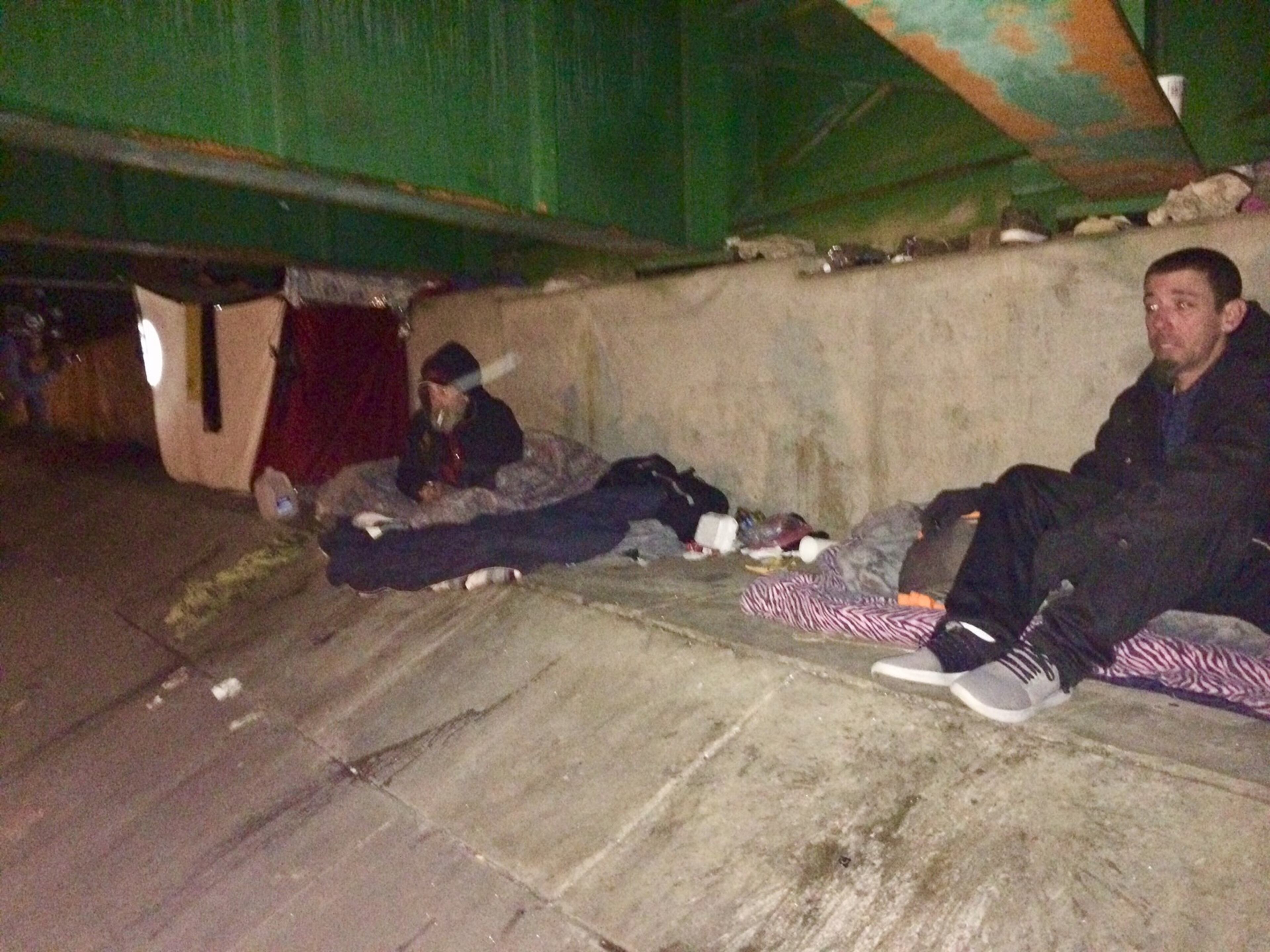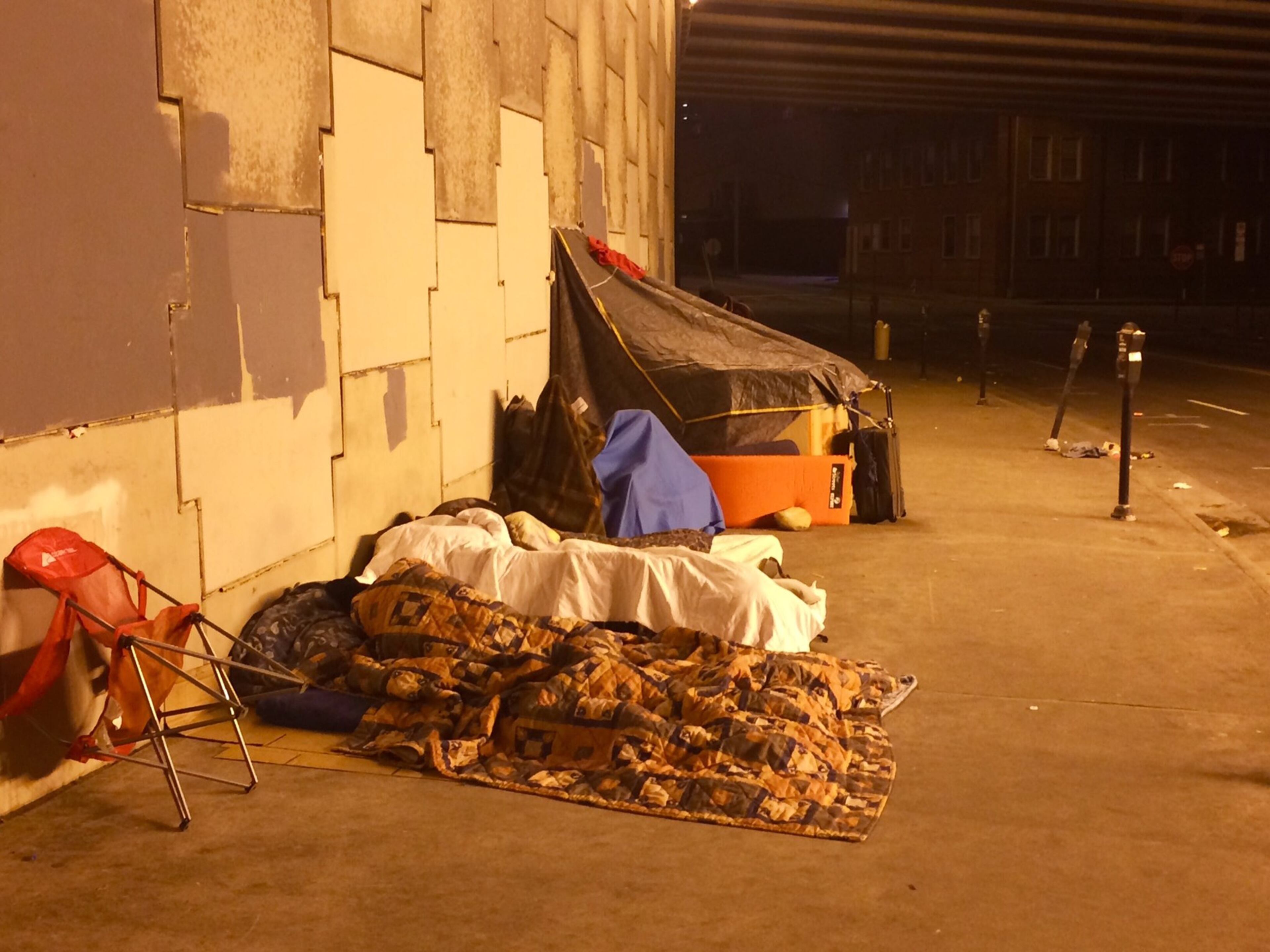Torpy at Large: The homeless census, or numbers you can't count on

It was organized chaos, with a hint of desperation, Tuesday night outside the Gateway Center in south downtown Atlanta.
A team of earnest young people in orange reflective vests with clipboards were encountering homeless people who had descended on the homeless facility looking to escape the bitter winds.
For the price of a $5 McDonald’s gift card, survey takers got the denizens of the night to answer four pages of questions: Are you a veteran? Do you have severe mental illness? HIV? How long have you been on the streets? Do you have bad credit?
It's time again for the homeless census, an accounting tool that measures one faction of society's misery index.

Last year, the number of homeless in the city of Atlanta dropped to 3,076, a 14 percent decline from the year before. In fact, the official count has been dropping for years, more than 40 percent since 2013. But the seeming exactitude of that number — 3,076 — belies the difficulty of measuring a population adept at melting away at the margins.
That number is actually an guesstimate because there’s no turnstile to click them off and keep count. It’s a baseline measured year after year. This year’s numbers aren’t in yet.
About 30 teams of census takers (each with a police officer in tow for safety purposes) drive to known “hot spots” and then check under bridges, walk side streets and literally beat the bushes to find the homeless and pepper them with questions. Officialdom wants to know more about the homeless population to try to figure out how best to help them.
On this night, it was 43 degrees but stiff winds made it feel much colder. Gateway's lobby, which serves as an emergency shelter, had about 60 men huddled uncomfortably on folding chairs. The lobby was full after 10 p.m. and a constant stream of shivering people were turned away and learned that other emergency warming shelters wouldn't be opening because temps had not fallen below 40 degrees.
“The system works to keep people from dying,” said George Chidi, the homelessness point man for Central Atlanta Progress. “But you still have a number of people who are freaking cold.”

The constant stream of the destitute made it easy pickings for the info gatherers — the interviewees were coming to them. The street was a snapshot of the surreal:
“I took the survey! Now I need somewhere to go!” said Chris Chapman, a youngish man. “I dunno what else to do.”
A woman in house slippers and thin pink socks danced in the wind to stay warm as she answered questions, while another woman stalked around, shouting angry bursts to no one in particular about white people and the year 1651.
A man pushed a wheelchair loaded with his belongings past bundled forms lying on the sidewalk and a woman leaned against the building answering questions. PTSD? “Yes, I’m going through a lotta pain right now.” And, “Yes, I was in foster care.”
RELATED: With weeks of winter still to come, Atlanta’s homeless seek shelter
RELATED: Gwinnett's homeless to be counted for first time since shelter closed
Larry Simpson, a grizzled 58-year-old with a plumbing background, was inside Gateway’s lobby and looking to take a survey. The McDonald’s cards are a draw but I’ve found the homeless are generally willing to talk about their situation. I suppose they’re glad someone is paying attention to them.
Simpson has been homeless for two years and pointed to a guy in a wheelchair he looks after. You’ve got to team up on the streets. It’s about survival.
Where does he sleep? “Anywhere I can,” he said. “You see what I got, no blankets, no extra clothes, no nothing.”
It’s a dilemma. When you travel light, you’re more mobile. Those who carry piles of belongings have the resources to stay warm but they are always worried about losing their stuff, about lugging it around, about finding safe places to leave it.
Why are they on the streets? Usually, they weave meandering stories of woe and bad luck, but surveys largely boil it down to substance abuse and severe mental illness, especially for the chronically homeless. The old trope about being a paycheck away from homelessness is largely overtold. If you’re under a bridge getting counted tonight, there’s a lot more back story than a few missed paychecks.
Torpy at Large: He sang at the White House but still died homeless
Torpy at Large: More homeless in ATL? Stats say no, eyes say otherwise
Torpy at Large: We want the troubled to get well. Just not next door
I took off and found a census team led by a man named Chris Dutton walking around under I-20 just south of downtown. Later, he said his team interviewed 23 homeless people and had seven more who wouldn’t talk. Census takers will try to catch up with those who were missed — or who wouldn’t talk — in the next few days as they wander into soup kitchens or shelters.
Thomas Wardham, a young man from Birmingham, sat on a ledge atop a concrete rise where he had created a makeshift bed just underneath hundreds of cars passing above.
He unloaded a sleeping bag from his backpack after taking the survey. “I keep it on me during the day so no one steals it,” he said. “Some people are evil to us.”

I drove around from 11:30 p.m. to nearly 2 a.m. doing my own census, asking homeless people if they had been counted. None had out of the 15 or so I encountered, showing the difficulty of enumerating such a transient population.
The disoriented man on the steps of the Georgia Aquarium hadn’t been counted. Nor had the men with tents in the doorway of Burden’s Barbershop near Auburn Avenue. Nor the clusters of men on John Wesley Dobbs Avenue under the Connector.
The lady standing wrapped in a comforter near the Westin Peachtree Plaza hadn’t. Nor had Ramon Richardson, who sat in a blanket on a sidewalk within sight of the Mercedes-Benz Stadium, which was lit up like a Christmas tree with the Super Bowl coming. You want surreal? Try talking to castaways at 1 a.m. as the city gears up for a mega party.
The city this month said it would start removing homeless camps but quickly added it was not related to cleaning up for Super Bowl guests.
James Miller, 61 and without front teeth, walked along Edgewood Avenue and figured he’d sleep under the highway. “You don’t have a blanket, do you?” he asked. No, but for some reason I had an old beach towel in the van.
“That’ll do,” he said, catching the towel before trudging off into the night.



